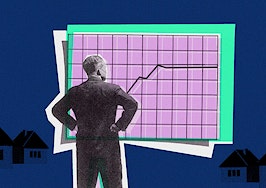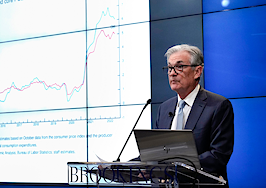Mark your calendars for the ultimate real estate experiences with Inman’s upcoming events! Dive into the future at Connect Miami, immerse in luxury at Luxury Connect, and converge with industry leaders at Inman Connect Las Vegas. Discover more and join the industry’s best at inman.com/events.
A firming up of mortgage rates in the new year finally caught up with homebuyer demand last week with applications for purchase loans falling for the first time in 2024, according to a weekly survey of lenders by the Mortgage Bankers Association (MBA).
The MBA’s Weekly Mortgage Applications Survey showed applications for purchase loans fell by a seasonally adjusted 11 percent last week when compared to the week before, and were down 20 percent from the same time a year ago. Applications to refinance were up 2 percent week over week and 3 percent from a year ago.
Applications for purchase mortgages kicked off the New Year with three consecutive weeks of increasing demand, driven by a pullback in mortgage rates from 2023 highs in November and December. But rates have held steady in January, and listings remain scarce by historical standards.

Joel Kan
“Low existing housing supply is limiting options for prospective buyers and is keeping home-price growth elevated, resulting in a one-two punch that continues to constrain home purchase activity,” MBA Deputy Chief Economist Joel Kan said, in a statement. “The average loan size for purchase applications has picked up in recent weeks to $444,100, the largest average loan size since May 2022.”
Mortgage rates in limbo after pullback
At 6.60 percent Tuesday, rates on 30-year fixed-rate conforming mortgages remain 1.23 percentage points below the 2023 peak of 7.83 percent registered Oct. 25, but slightly higher than the recent low of 6.56 percent registered on Dec. 27, according to loan lock data collected by Optimal Blue.
For the week ending Jan. 26, the MBA reported average rates for the following types of loans:
- Rates for 30-year fixed-rate conforming mortgages (loan balances of $766,550 or less) were unchanged at 6.78 percent. But with points increasing to 0.65 from 0.63 (including the origination fee) for 80 percent loan-to-value ratio (LTV) loans, the effective rate increased.
- For 30-year fixed-rate jumbo mortgages (loan balances greater than $766,550), rates were unchanged at 6.94 percent. With points decreasing only slightly, to 0.45 from 0.46 (including the origination fee) for 80 percent LTV loans, the effective rate remained unchanged.
- Rates for 30-year fixed-rate FHA mortgages averaged 6.61 percent, up from 6.51 percent the week before. Although points decreased to 0.79 from 0.87 (including the origination fee) for 80 percent LTV loans, the effective rate also increased.
- For 15-year fixed-rate mortgages, rates averaged 6.34 percent, up from 6.31 percent the week before. Although points decreased to 0.53 from 0.59 (including the origination fee) for 80 percent LTV loans, the effective rate also increased.
- Rates for 5/1 adjustable-rate mortgages (ARMs) averaged 6.23 percent, up from 6.22 percent the week before. With points increasing to 0.59 from 0.49 (including the origination fee) for 80 percent LTV loans, the effective rate also increased.
While many economists expect mortgage rates to decline further this year, the timing remains uncertain, with the Federal Reserve not expected to begin cutting rates until March at the earliest.
The CME FedWatch Tool, which tracks futures markets to predict the Fed’s future moves, showed investors on Wednesday were putting the odds of a Mar. 20 Fed rate cut at slightly less than even.
For now, buyers, sellers and their agents may continue to employ strategies like rate buydowns and assumable mortgages to help would-be homebuyers cope with the higher cost of borrowing.
Get Inman’s Mortgage Brief Newsletter delivered right to your inbox. A weekly roundup of all the biggest news in the world of mortgages and closings delivered every Wednesday. Click here to subscribe.












